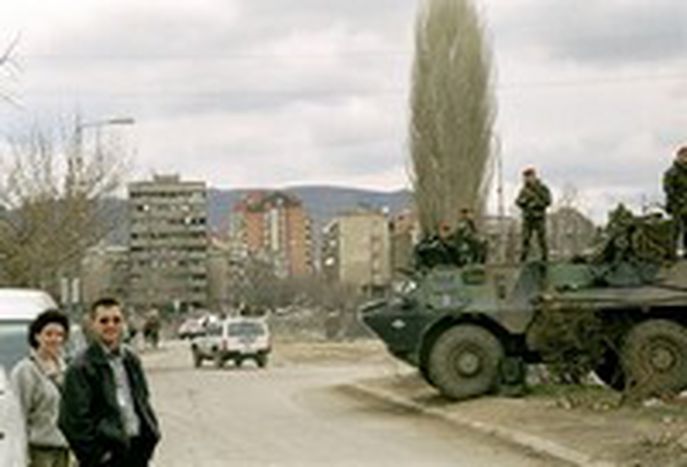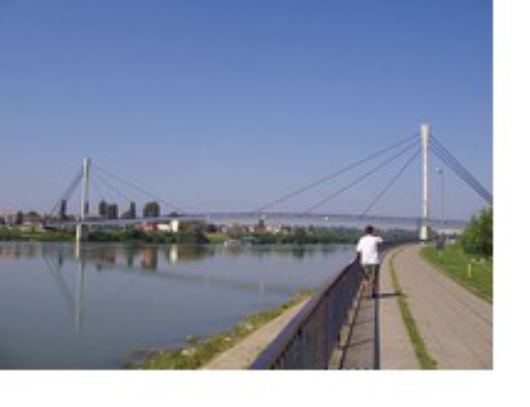
Kosovo's future lies within Europe
Published on
On Feb 27 in Belgrade, 15, 000 Serbs protested against the UN's plans for independence from Serbia. What do Serbs and Albanians think about Kosovar identity?
Mitrovica is an explosive town in the north of Kosova, its river separating the two parts of its population. Underneath a clear blue sky, I walk past the barbed wire and cross the bridge, watched by two listless French soldiers. On the terrace of café La Dolce Vita, I meet Oliver Ivanovi. The leader of the Kosovar Serb party might have been George Clooney’s ironical brother: greying hair, masculine jawline and around the corners of his mouth the permanent little smile of someone who knows that people will always disagree with him.
Staying Serb
 For a Serb politician, he is remarkably willing to face reality. ‘My position would be maximum autonomy for Kosovo, no independence. But if,’ and this is a hypothesis hardly any Serb politician cares to entertain, ‘this country will be independent, then I will remain a Serb in Kosovo, just like they used to be Kosovars in Serbia. The whole debate about national identity is nothing more than a political project.’ He says this, while featuring on Java’s front page this week: ‘If we Serbs want to live in Kosovo, we will have to communicate with the Albanians.’
For a Serb politician, he is remarkably willing to face reality. ‘My position would be maximum autonomy for Kosovo, no independence. But if,’ and this is a hypothesis hardly any Serb politician cares to entertain, ‘this country will be independent, then I will remain a Serb in Kosovo, just like they used to be Kosovars in Serbia. The whole debate about national identity is nothing more than a political project.’ He says this, while featuring on Java’s front page this week: ‘If we Serbs want to live in Kosovo, we will have to communicate with the Albanians.’
What is Kosovar identity if just an illusion? 'The only identity we share is with Serbia. We are even more Serb than the people of Serbia itself,' says Ivanovi with a thin smile. On becoming a functioning democracy, he says that: ‘we can live and work together, as long as minority rights are guaranteed. The international community will not grant the Albanians independence until they have proven their ability to let us have our rightful place in the system. I see our future inside the EU, with two constitutional peoples, just like Belgium for example.’
And is he prepared to be the Serb voice when Migjen Kelmendi - editor-in-chief of the Java magazine and the man who started the debate about Kosovar identity - decides to publish a second edition of his book? ‘He can always come and interview me. I will say exactly what I am saying today. But he's losing terrain; maybe he should just go back to being a writer.’
Kosovo's most sensible man
Back in the capital Priština, Shkelzen Maliqi, a philosopher donning a boyish baseball cap and with the white beard of an Albanian senior, is enjoying the sunshine on the grass in front of café Toto. Business and politics here seems to be done over coffee and rakija (brandy-like liqour typical of the Balkans). Ramush Haradinaj, the bailed former young prime minister who was charged by the Hague with crimes committed during the armed conflicts in Kosovo in 1998 and 1999, often frequents café tables like these.
These Kosovar cafés are run by stubborn small entrepreneurs, used to look after their own. They may not have a tradition of autonomy as a nation, as individuals they have no talent for dependence. When recent reports state the rise of religion among the young and jobless, it is often in a more spiritual Sufi line. Even to the imam, Kosovars will not hand over their independence.
Maliqi is the epitome of this mental independence. Branded the 'most sensible man in Kosova,' the philosopher has never entered active politics. Whenever his opinions counter those of the majority, he has to hear how his father used to be the head of the local Serb secret police.
Europe's future: Balkanic
He grumbles agreement with Ivanovi. 'Frustrations will lessen if we take care of improvements in the infrastructure, the agriculture and the labour market. The Serbs will have to receive guarantees, including strong ties with the motherland. Everything under international scrutiny, to begin with, and later inside the EU. A shared identity can have a mobilising effect in times of threat, but the need for it disappears once those are gone.'
Today, he recognises things are moving. ‘The ideals that political parties were built upon – the war, the independence – lie behind us. The structure of power is changing; newcomers, wealthy businessmen are entering the stage. A new generation will communicate differently with the Serbs and other minorities.’ Like a true optimist, he claims this is a matter of common sense. 'The generation that was shaped by occupation and war will make place for a younger more mobile one. It will put together its identity from a more international context, and thus become less and less ‘Albanian'.
Everyone I speak to stresses the same condition: the future lies within the European Union. The age-old opposition between the Serbian and the Albanian dream will have to dissolve in the Europe of fluid borderlines and hybrid identities. Intellectuals in the region call the Balkans the 'future of Europe'. Not its primitive backwaters, but its frontrunner on the way to a reality in which debates over national identity have become an anachronism.



